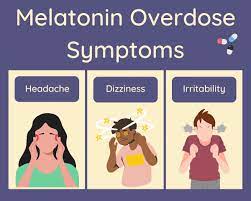Melatonin Overdose: Symptoms, Risks, and Safety
Melatonin, a hormone produced by the pineal gland, plays a crucial role in regulating sleep-wake cycles. While melatonin supplements are popular for aiding sleep, it’s important to be aware of the potential risks and implications of melatonin overdose. In this guide, we’ll explore what melatonin overdose entails, its symptoms, risks, and the steps you can take to ensure safe and responsible usage.
What is Melatonin Overdose?
Melatonin overdose occurs when an individual consumes an excessive amount of melatonin, leading to unwanted side effects. Unlike traditional medications, melatonin is a hormone that helps synchronize the body’s internal clock. When taken inappropriately high doses, it can disrupt the delicate balance required for healthy sleep patterns.
Factors Influencing Overdose Risk:
Several factors can contribute to the risk of melatonin overdose. These include individual sensitivity, the form of melatonin used (such as pills or gummies), and the dosage. It’s crucial to adhere to recommended dosages and consult healthcare professionals before use.
Signs and Symptoms of Melatonin Overdose
Recognizing the signs of melatonin overdose is essential for prompt intervention. While individual responses may vary, common symptoms of melatonin overdose include:
Nausea and Vomiting:
Excessive melatonin can lead to feelings of nausea and even vomiting.
Dizziness and Headaches:
Overdose may cause dizziness and intense headaches.
Daytime Sleepiness:
Ironically, excessive melatonin can lead to daytime sleepiness or grogginess.
Confusion and Disorientation:
Overdosing might result in confusion or difficulty concentrating.
Possible Side Effects:
Overdosing on melatonin can cause uncomfortable side effects that disrupt normal daily activities. It’s crucial to pay attention to these symptoms and take appropriate action.
Risks and Complications of Melatonin Overdose
While melatonin is generally considered safe when used responsibly, excessive consumption can lead to various risks and complications:
Disrupted Sleep Patterns:
Paradoxically, overdose can disrupt sleep patterns rather than improve them, causing irregularities in sleep-wake cycles.
Hormonal Imbalance:
Melatonin is intricately linked to the body’s hormonal balance. Overdose can disrupt this balance, impacting not only sleep but also other bodily functions.
Interactions with Medications:
Melatonin can interact with certain medications, amplifying their effects. It’s crucial to disclose all medications to healthcare providers.
Long-Term Impact:
The long-term consequences of frequent melatonin overdose are not yet fully understood, making responsible usage even more critical.

Preventing Melatonin Overdose
Preventing melatonin overdose involves informed decision-making and adherence to recommended guidelines:
Dosage Recommendations:
Melatonin supplements are available in various strengths. Start with the lowest effective dose and gradually adjust as needed.
Professional Guidance:
Before using melatonin supplements, consult with a healthcare professional. They can provide personalized recommendations based on your specific needs and health conditions.
Interactions with Medications and Safety Measures
Understanding potential interactions between melatonin and other medications is crucial to ensure your overall well-being. Additionally, adopting safety measures can help you make informed decisions and avoid the risks associated with melatonin overdose.
Interactions with Medications:
Melatonin can interact with various medications, including blood thinners, anti-seizure drugs, and antidepressants. These interactions can amplify the effects of the medications, leading to unintended consequences. It’s essential to inform your healthcare provider about all medications you’re taking, including melatonin supplements.
Safety Measures to Consider:
Consult Healthcare Professionals:
Before incorporating melatonin into your routine, discuss your intentions with a healthcare professional. They can assess your medical history and suggest appropriate dosages.
Start with a Low Dose:
Begin with the lowest available dose of melatonin and evaluate how your body responds. Gradually increase the dosage only if necessary.
Avoid Long-Term Dependency:
Melatonin supplements are not intended for long-term daily use. Reserve them for occasional sleep disruptions and jet lag.
Limit Exposure to Light:
Prioritize creating a conducive sleep environment by minimizing exposure to screens and bright lights before bedtime. This supports the natural production of melatonin.
Establish a Consistent Sleep Schedule:
Maintaining a regular sleep schedule helps regulate your body’s internal clock and reduces the need for melatonin supplementation.
Recognizing Individual Needs and Responsibly Using Melatonin
Each individual’s sleep needs and response to melatonin are unique. Recognizing your personal requirements and practicing responsible usage can contribute to effective sleep management without the risk of overdose.
Personalized Sleep Needs:
The amount of sleep required varies from person to person. Factors such as age, activity level, and overall health play a role in determining optimal sleep duration.
Listening to Your Body:
Pay attention to your body’s cues. If you find melatonin supplements unnecessary on certain nights, consider relying on natural sleep techniques instead.
Balanced Approach:
While melatonin can be beneficial for managing sleep disruptions, it’s important to strike a balance. Incorporate lifestyle changes, such as stress reduction techniques and healthy sleep habits, for sustainable sleep improvement.
Conclusion
In conclusion, melatonin supplements can offer valuable support for managing sleep issues, but it’s essential to approach them with caution and awareness. Understanding the risks of melatonin overdose, recognizing its symptoms, and taking preventive measures can help you enjoy the benefits of melatonin while minimizing potential complications.
Prioritize consulting healthcare professionals before starting melatonin supplementation, and be mindful of interactions with other medications. By making informed decisions, adhering to recommended dosages, and adopting healthy sleep practices, you can harness the power of melatonin responsibly and foster optimal sleep health.




